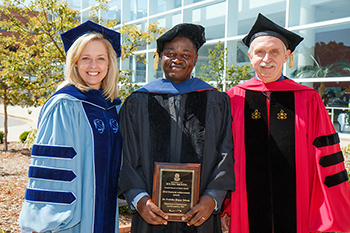Cancer research aided by graduate student’s studies
June 25, 2014

Dr. Fred Tabung, center, celebrated his Doctoral Achievement Award from the Arnold School with faculty mentors Dr. Susan Steck and Dr. James Hébert.
Fred Tabung realized early in his public health career in Cameroon that too many men and women were being diagnosed with cancer at advanced stages of disease.
“I also realized that I was not knowledgeable about the risk factors associated with different forms of cancer, and I recognized that my country had few health screenings in place,” he said. “People came to the hospitals to be diagnosed. By then, it was too late for many of them.”
With this knowledge, Tabung, who graduates in August with his doctoral degree in epidemiology from the Arnold School of Public Health, could not be a bystander to the health problems that he was seeing at the Yaounde General Hospital in Cameroon where he was working as a Medical Laboratory Science Officer. He began the nation’s first cancer registry, called the Yaounde Population Cancer Registry.
Tabung brought that same determination to unravel the complexities of disease processes and risk factors from his native country to the Arnold School, first as a master’s degree student for which he had received a Fulbright Foreign Student Program award in 2007. He worked with cancer researcher Dr. Susan Steck at the Arnold School and focused on cancer epidemiology. His thesis work examined the intake of grains and fiber and prostate cancer aggressiveness by race.
“It is so important that we learn how to prevent cancers before they start,” Tabung said. “For many people, treatment may not be available, especially for those in developing countries.”
He went back to Cameroon in 2009 for two years in order to fulfill the Fulbright requirements of his master’s degree program and worked with humanitarian efforts of the Danish Refugee Council (DRC) in the countries of the Horn of Africa. The DRC works in dozens of countries throughout the world to assist refugees and internally displaced persons, as well as returnees through emergency aid.
In 2011, Tabung returned to the Arnold School as a graduate research assistant, again working with Steck in the field of cancer epidemiology. He became part of the Arnold School research team that has investigated the Dietary Inflammatory Index, which assesses the inflammatory effect of diet on human health. The research is vital to chronic disease conditions, include cancer and heart disease.
During his academic career at the Arnold School, Tabung received numerous awards, grant funding and accolades for his research.
Steck praised Tabung as an “exceptional doctoral student in all aspects of scholarly activity.”
As evidence of the high regard in which he is held and the potential impact of his work, Steck said, “He was awarded a very prestigious F31 pre-doctoral fellowship from the National Institutes of Health to support his dissertation project, as well as a Support to Promote Advancement in Research and Creativity (SPARC) from the USC Office of the Vice President for Research and a fellowship from the Center for Colon Cancer Research.”
In addition to these awards, “Fred has won numerous travel awards to present his very interesting research findings at national scientific conferences,” Steck said. “Given his accomplishments, Fred received the deserving honor of being named one of 14 USC Graduate Breakthrough Scholars in 2014.”
Steck and Tabung collaborated on a grant, funded by the Prevent Cancer Foundation, to study the impact of a dietary inflammatory index on reducing the risks of breast and colorectal cancers.
In recent months, Tabung was one of nine finalists for the Nutritional Epidemiology research interest section graduate poster competition at the Experimental Biology/American Society for Nutrition annual meeting in San Diego. He also won the Best Student Poster at the American Society of Preventive Oncology annual meeting in Arlington, Va., and received a travel award from the society to present his research.
At the Arnold School's Hooding Ceremony in May, Tabung was selected to receive the Doctoral Achievement Award.
Tabung, who balanced the responsibilities of graduate school with his life as husband and father of three children, credited the Arnold School with “the opportunity to conduct high-quality research” and said that his graduate school studies “have been enhanced by a wonderful team of mentors.”
Steck, who chaired his dissertation committee, "is my champion," he said. “She has provided me with a well-rounded training on cancer and cancer prevention. The Arnold School gave me the ability to compete on the national level for grants and awards. Others found something in me that was above what other students had achieved.”
Among Tabung’s mentors are Arnold School faculty who served on his dissertation committee, including Drs. James Hébert, Angela Liese and Jiajia Zhang, all from the Department of Epidemiology and Biostatistics. Dr. Yunsheng Ma from University of Massachusetts Medical School also served on the committee.
Because of his professional and humanitarian posts, one of Tabung’s long-term goals is to develop collaborations necessary to conduct international cancer research. For now, he has accepted a postdoctoral position at the Harvard School of Public Health.
“It has been a delight to work with Fred, and I look forward to seeing the great impact he will have on the field of nutrition and cancer prevention and control as he progresses in his career,” Steck said.



_01.jpg)
_02.jpg)